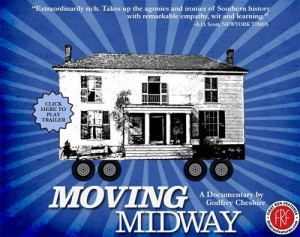
This was my second Ebertfest. Last year, I worked as a volunteer/intern for the film festival, so I got to sneak into a couple films. I have to admit that this year has been hectic for me, so I didn’t realize Ebertfest was just around the corner until Professor Baird mentioned it in class. So, I scrambled over to Virginia Theater for the four o’clock show. I also must admit that I didn’t know which movie I would be watching.
This is something I noticed last year: the demographics at Ebertfest are not what one would call diverse. I felt young standing in the crowd in front of the theater. Perhaps it was because the show time was earlier in the day, but it was hard to find people who fit the typical university age range. It would be great if the film festival could expand its audience.
After a quick Google search of the film I would be watching, Moving Midway, the lights dimmed, and the feature began. Obviously, I had little to no expectation going into the film this way. Still, the premise sounded interesting. The plot centers on moving Midway Plantation. After generations of literally keeping their ground, the owners of the plantation (Charlie and Dena) decide to move the plantation.
The family is leaving behind decades of tradition. But, in the process of uprooting, basically, their legacy, the Hintons are discovering a new family history. As former slave owners, the family “bred two sets of Hintons, one white, one black” (Cheshire). The single act of moving Midway Plantation sheds lights on multiple themes: the definition of family, the visibility/invisibility of race, ownership, and the reclamation of history.
I’m actually glad that I went into this movie little expectations because I loved it. The story quickly draws in the audience; an hour and thirty minutes flies by. Another aspect that made this film so entertaining was the characters. I think I was laughing through most of the film. Each major character is so dynamic and witty; their personalities gave life to this documentary.
One of the most heartwarming parts of Moving Midway is being able to watch how the Hintons redefine what “family” means to them. The first Hinton family gathering is vastly different from the Hinton family gathering at the new Midway Plantation. It is fascinating to be able to see the “black” and “white” Hintons literally and figuratively coming together. Through this rediscovery of family, the Hintons are not only preserving tradition but also reclaiming their place in history. This reclamation of history is highlighted when the “black Hintons” are invited into the new Midway Plantation; one of the relatives asks if he can come in. This moment is both heartwarming and heart-wrenching. The fact that people who rightfully belong in this place find it hard to believe that they are allowed to enter the house is heart breaking. It also proves that we are not free from this moment in history. Racism is still very much a relevant issue.
Moving Midway is quietly heartwarming; there is nothing forced or inorganic about this documentary. I appreciate the depth beneath the humor and lightheartedness.
Cheshire, Godfrey. “Moving Midway.” IMDb. IMDb.com, n.d. Web. 24 Apr. 2015. <http://www.imdb.com/title/tt1051245/>.

